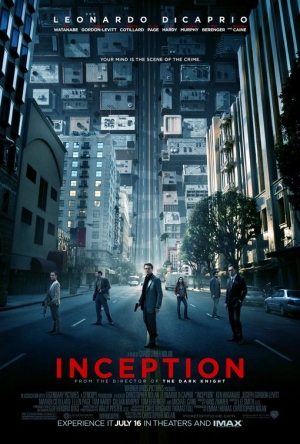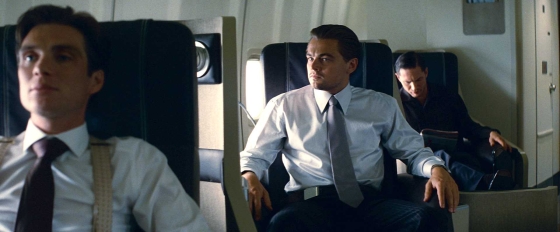A blockbuster with brains and style, Inception is Christopher Nolan’s most ambitious film to date, although how mainstream audiences respond to this intricate tale is an open question.
The story revolves around a gang of hi-tech thieves led by international fugitive Dom Cobb (Leonardo DiCaprio), who steals highly valuable information from people’s dreams.
After a job on a Japanese businessman (Ken Watanabe) goes wrong, he is faced with the daunting challenge of ‘inception’: instead of stealing information, he must secretly plant some inside the mind of an important businessman (Cillian Murphy).
Assembling a team of experts (which includes Joseph Gordon-Levitt, Ellen Page and Tom Hardy) who can help him execute the mission, he must also deal with his own troubled past, which endangers his ability to do the job at hand.
To say any more about the plot of Inception would be wrong, as one of the chief pleasures in this lavishly intricate film is the way in which it unfolds, puzzling and surprising the audience like a virtuoso magician.
For writer-director Nolan, this is a return to the territory of previous films such as Memento (2000) and The Prestige (2006), where he explores the themes of illusion and reality whilst playing an imaginative game with the audience.
We are firmly in the realm of science-fiction here, but interestingly the settings are very real world: imagine if Michael Mann had decided to mash up The Matrix with Ocean’s Eleven and you’ll get some idea of the terrain here.
With some concessions, the subconscious dream worlds appear as realistic as the conscious waking world, creating a persistent question as to which is real. A clever conceit, given that cinema itself is arguably the closest art form to a dream.
 DiCaprio is very solid in the lead role and his team have also been well cast: Joseph Gordon Levitt is a charming point man; Ellen Page nicely combines innocence and gravity as the rookie ‘dream architect’; Tom Hardy relishes his part as a forgerer; Ken Watanabe is a pleasingly enigmatic boss figure; Cillian Murphy conveys surprising depth as the rich mark and Michael Caine hits the spot in a smaller than usual part.
DiCaprio is very solid in the lead role and his team have also been well cast: Joseph Gordon Levitt is a charming point man; Ellen Page nicely combines innocence and gravity as the rookie ‘dream architect’; Tom Hardy relishes his part as a forgerer; Ken Watanabe is a pleasingly enigmatic boss figure; Cillian Murphy conveys surprising depth as the rich mark and Michael Caine hits the spot in a smaller than usual part.
In a more challenging role, Marion Cotillard doesn’t quite hit the emotional mark required but her subplot is cleverly woven into the film and also bears some striking similarities to a key part of Memento.
The realistic touches inside a surreal world of dreamscapes, lends a sheen of believability and although the plot is an intricate hall of mirrors, there is enough exposition baked into the narrative to keep discerning audiences focused.
One could characterise Nolan’s Hollywood films so far as alternating between personal projects (Memento, The Prestige) and more commercial fare (Batman Begins, The Dark Knight), but Inception is an intriguing hybrid.
The dreamscapes and narrative open up at times like Russian dolls on acid, so it has a challenging art-house vibe, but it is also one of his most commercial to date in terms of scale and look.
There are many stylistic nods to action films of the 1960s: a team of experts assembled for a job; glamorous locations; vivid production design and costumes; a sense of mystery and wonder.
The Bond films of that decade seem a particular touchstone – one sequence plays like a homage to On Her Majesty’s Secret Service (1969) – and there are echoes of TV series from that era, such as Mission: Impossible and The Prisoner.
The huge success of The Dark Knight has allowed Nolan a particularly large canvas on which to paint and he has filled it with gleeful abandon, mixing the traditions of the spy thriller and heist movie inside a surreal, shifting dreamscape.
The cutting between the real and subconscious worlds bears many similarities to The Matrix (minus the bleak, sci-fi dystopia) and if it does hit home with audiences, then I’m sure this will be obvious reference point for many viewers.
As is now customary for a Nolan production, the technical aspects of the film are especially outstanding.
The production design by Guy Hendrix Dyas is stunning, using real world locations to marvellous effect; Wally Pfister’s cinematography (utilising several formats including 35mm, 65mm and Vista Vision) captures intense emotions and epic action beautifully.
The visual effects (by Double Negative and Plowman Craven) are stunning and blended in so well that they never feel like conventional CGI.
In addition, there are some highly imaginative sets overseen by special effects supervisor Chris Corbould, especially one amazing sequence involving a hotel, which bears comparison to those in Stanley Kubrick’s 2001.
A special mention must also go to editor Lee Smith, as the third act involves some inventive warping of time and space, which must have proved a particular challenge in the edit suite.
Warner Bros may be concerned that mainstream audiences will be confused by the puzzle Nolan lays out. It should play well to most critics and discerning audiences eager for intelligent summer entertainment.
The litmus test for many will be the extended opening sequence. Go with it and you should not have a problem with the cinematic maze Nolan has built.
A lot of Nolan’s previous work rewards repeated viewing, revealing a meticulous attention to detail and subtleties not always apparent first time around.
Inception is no different and I look forward to seeing it again with a better understanding of how the narrative will map out. It works on first viewing but there are times when the ride is intense and you have to hold on to keep your bearings.
For Warner Bros, this must have proved something of a nightmare to market but the trailers and TV spots so far have actually done a good job in selling the central concept of the film.
As far as the studio was concerned I imagine the risks of this production were offset by Nolan’s track record with the Batman films and DiCaprio’s A-list star power.
A sense of mystery has helped make a TV series like Lost such a success, so an optimist might predict that Inception could tap into a similar audience hungry for intrigue and it may even be one they return to in significant numbers.
The quality and surprising nature of this summer blockbuster has led to some effusive early praise, some of it a little over-the-top, but perhaps understandable given the current standard of studio films.
No doubt this will lead to a backlash of sorts (perhaps geeks wanting to stand out as refuseniks on Rotten Tomatoes?) but there is no denying the technical brilliance on display here in service of an audacious story.
Not all of the balls juggled stay in the air – and further scrutiny may uncover inconsistencies in the densely woven script – but, like a dream, you accept the thrilling reality of this film whilst you experience it.
Inception is a rare thing: a summer blockbuster filled with intelligence and craft, which in the current reality of remakes and sequels, feels like a dream itself.
> Official site
> Inception at the IMDb
> Reviews of Inception at Metacritic and Rotten Tomatoes
> Various Inception links at MUBI
> Find out more about Christopher Nolan at Wikipedia
